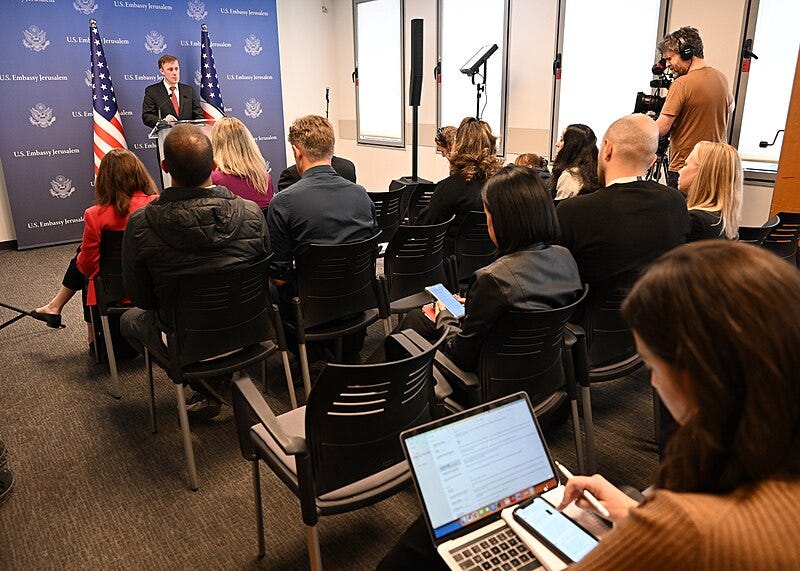On Jake Sullivan Re-Writing His Own History, And Darkening Ours
A critique of the insider profile, in general and in this specific case
Wired Magazine was once an edgy, techno-utopian voice for the Silicon Valley set. Libertarians underneath it all, but in a world of seemingly boundless growth and speculative capital, that used to mean optimism. As we’ve seen the last few years though, libertarianism quite easily curdles into ethnonationalist oligarchy if it’s not actually faithful to the principles it professes. Power has corrupted, absolutely.
In keeping with its emerging role as a discursive bridge between Big Tech and the national security state, Wired has gotten more political—in the apolitical sense, of course.
Their politics of nonpartisanship actually has much in common with the national security state, and so it should come as little surprise that Wired just published a long profile of Jake Sullivan—a quiet, busy, and tired (yet influential) loyalist to the world of Clinton and Biden. We have a bewildering number of (former) friends in common, and by all accounts, he’s a good guy in spite of overseeing a machine responsible for mass death and human misery on an ongoing basis.
The profile, called “The American Who Waged a Tech War on China,” is as the title says. The profiler—the author of the essay—is a good writer, and self-aware. Any journalist invited to interview a senior policy official is necessarily shown what the interviewee wants them to be shown. She seems to grasp that at the outset, starting off the piece by eyerolling at being forced to recount that she was given a tour around Jake Sullivan’s office to kick things off.
But then she makes a quick, credulous pivot, telling the reader about a heroic Japanese parable Sullivan relayed to her about strength in unity (“unity” being allies working to contain Chinese tech advancement) that made no sense in context.
From there, the profile slides into Jake’s world, becoming a voice box for one of the most powerful people in America. Although a far cry from Wired’s origins, the Wired of the 21st century has been mostly a mouthpiece for a certain slice of the ruling class.
The basic problem with this piece, as with journalistic profiles generally, is not that it lets the powerful be heard on their terms. It’s that it aspires to be something more; profile authors deny their own instrumentality, preferring to appear as honest, critical information brokers. But even if penetrating critique is their earnest goal, it’s simply not possible if the authors aren’t also a subject matter experts with perspectives other than that of their subject. A blank-canvas journalist—who only believes in truth and facts—is an un-self-aware journalist, and that makes for the worst kind of power-serving profiles.
This piece, as its title suggests, was framed as being about Sullivan’s “plan to keep the world’s most advanced semiconductors and the machines that make them out of China’s hands.” That positioning made Wired Magazine a suitable choice.
But Sullivan is not a tech aficionado, and doesn’t even pretend to be one. So it’s hard not to think that choosing Wired in the first place had a rather obvious ulterior motive: Sullivan chose a tech publication to profile him because it was least likely to bring up the ongoing genocide and metasticizing regional war in the Middle East that Sullivan has been helping orchestrate.
And sure enough, nowhere in the piece is any of the following words: Israel, Palestine, war crimes, genocide, humanitarian crisis, apartheid, settler colonialism, Lebanon, Hamas, Hezbollah. The idea that you could engage the US national security adviser in times like these and erase all of this from the profile speaks volumes about the spin that’s happening—a flashing red light that we are entering hagiography territory.
But even bracketing off the Middle East, this profile reveals some staunch beliefs in what is ultimately bad analysis regarding China, political economy, and US technology policy.
Let me explain.


